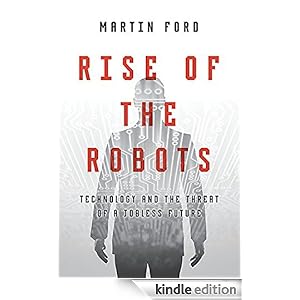By Patrick Tucker
The Lights in the Tunnel: Automation, Accelerating Technology and the Economy of the Future by Martin Ford. Acculant Publishing. 2009. 253 pages. $15.95. Paperback.
In The Lights in the Tunnel, Silicon Valley entrepreneur Martin Ford argues that technologies such as software automation algorithms, artificial intelligence (AI), and robotics will result in dramatically increasing unemployment, stagnant or falling consumer demand, and a financial crisis surpassing the Great Depression.
The U.S. Bureau of Labor Statistics foresees automation and AI-assisted outsourcing restraining job growth, particularly in the field of office and administrative support. But the Bureau still anticipates growth in this sector of roughly 7.3 million job openings from 2008 to 2018, as well as growth in most others.
These forecasts are woefully optimistic, in Ford’s view. He says that mainstream economists do not consider the possibility of radical breakthroughs of automation technology when making their projections. In a worst-case scenario, every job that can conceivably be automated will be turned over to the robots. The unemployment rate under such a scenario defies easy calculation, but the current rate of 9% would look idyllic in retrospect.
Other potential effects of superautomation according to Ford include:
The high-profit, small-staff business model will rule. An example is the Web-based movie-rental company Netflix, which has effectively driven rival Blockbuster to bankruptcy. Consumer demand for goods will plummet as unemployment rises. Defaults on mortgages and consumer debt will reach unprecedented levels, and plunging values for housing and other assets will result in cascading financial crises. College enrollment will fall as potential students shy away from “knowledge worker” jobs that are susceptible to automation and off-shoring. Young people will instead compete for trade jobs in the occupations that can’t be automated. (Hypothetical examples here might include nursing or even specific types of high-tech machine repair.) Governments will face rising pressure to restrict technological progress. Organized labor may realize a last-ditch resurgence. High unemployment in developed countries will dramatically reduce demand for foreign-manufactured goods. The result may be social unrest and political instability in places like China as export trade crumbles. The U.S. government’s already dire projections for pensions and government entitlements will become even more dismal as wide unemployment among young people decimates payroll tax revenues. Sovereign debt crises—of the type playing out in Greece at the time of this writing — will spread as demand for government services outstrips revenue. Political battles will become even more heated, partisan, and irrational.
Ford’s solution to this calamity is at once obvious and politically unspeakable: Governments must devise a system to pay their unemployed populations to consume. Only in this way can the demand for goods stay bouyant and depression be avoided. Human labor may be largely superfluous in the automated economy of the twenty-first century, but broad-based consumption will remain essential.
The idea of consumption without labor is truly radical. In the developed world — and in the United States especially — work is tied directly to our individual sense of self worth and identity. Almost half of the unemployed people in the United States suffer from depression or anxiety; unemployed Americans are four times more likely than those with jobs to report symptoms of major depression, according to the American Psychological Association. Absent career ambition, how will capable, intelligent people discover and create meaning in their lives?
The answer, says Ford, is to distribute income on the basis of performance. Civic involvement, educational, research, or humanitarian accomplishments should be better compensated than indolence, allowing for competition. Effort and intelligence, well intended and skillfully applied, would still meet with reward. But the actions of these workers would not “necessarily result in ‘work’ in the traditional sense.”
From a reader’s perspective Lights in the Tunnel is an interesting referendum on King Camp Gillette’s 1894 socialist utopian treatise, The Human Drift. Gillette, inventor of the disposable razorblade of the same name, saw the Industrial Revolution leading inexorably to a future where a single robotic corporation created and distributed goods with perfect efficiency, a tomorrow of evermore capable machines freeing people from the chores and burdens of work in order that they might pursue intellectual passions.
Ford sees a similar future but calls “freedom” by another name: mass unemployment. The results of humankind’s liberation from labor would be unrest, high crime, loss of prosperity, and eventual societal collapse. This darker modern iteration of the Utopian ideal illustrates how easily the hopes of the past can become the horrors of tomorrow.
About the Reviewer
Patrick Tucker is the senior editor of THE FUTURIST magazine.
Below is another book by the reviewed author, who also has a blog called Econfuture Ecohttps://econfuture.wordpress.com/
The Lights in the Tunnel: Automation, Accelerating Technology and the Economy of the Future by Martin Ford. Acculant Publishing. 2009. 253 pages. $15.95. Paperback.
In The Lights in the Tunnel, Silicon Valley entrepreneur Martin Ford argues that technologies such as software automation algorithms, artificial intelligence (AI), and robotics will result in dramatically increasing unemployment, stagnant or falling consumer demand, and a financial crisis surpassing the Great Depression.
The U.S. Bureau of Labor Statistics foresees automation and AI-assisted outsourcing restraining job growth, particularly in the field of office and administrative support. But the Bureau still anticipates growth in this sector of roughly 7.3 million job openings from 2008 to 2018, as well as growth in most others.
These forecasts are woefully optimistic, in Ford’s view. He says that mainstream economists do not consider the possibility of radical breakthroughs of automation technology when making their projections. In a worst-case scenario, every job that can conceivably be automated will be turned over to the robots. The unemployment rate under such a scenario defies easy calculation, but the current rate of 9% would look idyllic in retrospect.
Other potential effects of superautomation according to Ford include:
The high-profit, small-staff business model will rule. An example is the Web-based movie-rental company Netflix, which has effectively driven rival Blockbuster to bankruptcy. Consumer demand for goods will plummet as unemployment rises. Defaults on mortgages and consumer debt will reach unprecedented levels, and plunging values for housing and other assets will result in cascading financial crises. College enrollment will fall as potential students shy away from “knowledge worker” jobs that are susceptible to automation and off-shoring. Young people will instead compete for trade jobs in the occupations that can’t be automated. (Hypothetical examples here might include nursing or even specific types of high-tech machine repair.) Governments will face rising pressure to restrict technological progress. Organized labor may realize a last-ditch resurgence. High unemployment in developed countries will dramatically reduce demand for foreign-manufactured goods. The result may be social unrest and political instability in places like China as export trade crumbles. The U.S. government’s already dire projections for pensions and government entitlements will become even more dismal as wide unemployment among young people decimates payroll tax revenues. Sovereign debt crises—of the type playing out in Greece at the time of this writing — will spread as demand for government services outstrips revenue. Political battles will become even more heated, partisan, and irrational.
Ford’s solution to this calamity is at once obvious and politically unspeakable: Governments must devise a system to pay their unemployed populations to consume. Only in this way can the demand for goods stay bouyant and depression be avoided. Human labor may be largely superfluous in the automated economy of the twenty-first century, but broad-based consumption will remain essential.
The idea of consumption without labor is truly radical. In the developed world — and in the United States especially — work is tied directly to our individual sense of self worth and identity. Almost half of the unemployed people in the United States suffer from depression or anxiety; unemployed Americans are four times more likely than those with jobs to report symptoms of major depression, according to the American Psychological Association. Absent career ambition, how will capable, intelligent people discover and create meaning in their lives?
The answer, says Ford, is to distribute income on the basis of performance. Civic involvement, educational, research, or humanitarian accomplishments should be better compensated than indolence, allowing for competition. Effort and intelligence, well intended and skillfully applied, would still meet with reward. But the actions of these workers would not “necessarily result in ‘work’ in the traditional sense.”
From a reader’s perspective Lights in the Tunnel is an interesting referendum on King Camp Gillette’s 1894 socialist utopian treatise, The Human Drift. Gillette, inventor of the disposable razorblade of the same name, saw the Industrial Revolution leading inexorably to a future where a single robotic corporation created and distributed goods with perfect efficiency, a tomorrow of evermore capable machines freeing people from the chores and burdens of work in order that they might pursue intellectual passions.
Ford sees a similar future but calls “freedom” by another name: mass unemployment. The results of humankind’s liberation from labor would be unrest, high crime, loss of prosperity, and eventual societal collapse. This darker modern iteration of the Utopian ideal illustrates how easily the hopes of the past can become the horrors of tomorrow.
About the Reviewer
Patrick Tucker is the senior editor of THE FUTURIST magazine.
Below is another book by the reviewed author, who also has a blog called Econfuture Ecohttps://econfuture.wordpress.com/
|
|



No comments:
Post a Comment